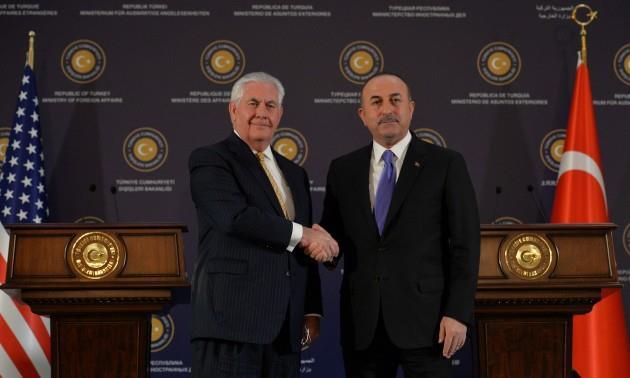
US baits Turkey in hopes of ending Ankara's Russian dalliance
When the host country openly patronizes a Track 2 – or ‘backchannel' – event, it becomes Track 1.5. The conference in Moscow on Monday under the rubric ‘Russia in the Middle East: Playing on Every Field,' seemed firmly in this category.
However, just as the event was about to begin, Iran's Foreign Minister, Mohammad Javad Zarif, joined Russia's, Sergey Lavrov, on the podium, raising matters to the level Track 1.
Must-reads from across Asia - directly to your inboxNonetheless, Turkey's absence must be noted. The backdrop is the US-Turkish "thaw" following a two-day visit to Ankara last weekend by the US Secretary of State Rex Tillerson. The first authoritative comments by the Trump administration regarding Tillerson's talks came from US Defence Secretary James Mattis, who said on Saturday:
'We concur with Turkey on the need for locals taking control of the liberated areas [in Syria], and we're going to work with Turkey on the locals taking control, and with Turkey on every other irritant, or diversion or distraction, or every area. We have many areas of absolute concurrence, too. Remember that, they are an ally. We work with them… So this is not an all-one-way issue, but there are significant issues that the Secretary of State and his foreign minister counterpart agreed that we would work through… I can't tell you that we've resolved them all. That means we're going to work through them. We're committed to them. That's where we're going.'
Mattis was donning a diplomatic hat in projecting such an optimistic assessment. Tillerson's talks in Ankara were wide-ranging and there were exchanges on creating and jointly managing a zone of influence in northern Syria. But for Turkey, the vacation of the region to the west of the Euphrates by US-backed Kurdish militias is a non-negotiable demand. The Pentagon will be hard-pressed to jettison its alliance with those militias.
The US-Turkey reconciliation process will not be easy. But then again, it does not suit either side to allow the discussions to reach a dead end anytime soon. Turkey's operation in Afrin is not going well and that puts future operations in doubt – which, in turn, gives time and space for both Ankara and Washington to negotiate. And for the US, while the Kurds may be regarded as useful (perhaps irreplaceable) footsoldiers, the resuscitation of an alliance with Turkey could be a game changer.
Washington senses that Turkish President Recep Erdogan is groping for a way forward. He has made an extra effort in recent weeks to mend ties with Germany, signaling that Turkey does not want isolation from the West. Make no mistake that Washington is greatly experienced in leveraging Turkish predicaments. Washington has shown time and again that it has a way of getting things done with Ankara, its time-tested cold war ally. Mattis' optimism reflects that.
The big question is how the Russian-Iranian alliance will respond to a potential US-Turkey entente in northern Syria. Indeed, it will be a major setback for Moscow and Tehran if Ankara reverts to coordinating with the US. Events on the ground in recent weeks should leave Moscow in no doubt that eliminating the Russian presence in Eastern Mediterranean is as much a priority for the Pentagon as rolling back Iranian influence in Syria. Russian President Vladimir Putin telephoned Erdogan on Monday to discuss Syria.
Afrin may seem the immediate focal point, but the various protagonists are attempting to create new facts on the ground. Russia and Iran have a congruence of interests in opposing the expansion of the US presence in northern Syria. (Afrin is the gateway to Idlib, which is adjacent to the coastal province of Latakia, where the Russian bases are located.)
Lavrov on Monday warned today that the US should not play with fire. In a hard-hitting speech at the Moscow conference, he alleged that the US is using the Kurds as a proxy and also covertly encouraging extremist groups to 'disintegrate Syria'. Meanwhile, the Tass news agency quoted Zarif as stressing to Lavrov that the flow of events 'demonstrates the depth of strategic relations between Iran and Russia, which have been playing a very important role in maintaining security and stability in our region.'
However, neither Moscow nor Tehran has voiced any criticism of Turkey. They seem reasonably confident that Turkish-American reconciliation is improbable, since Syria is only the tip of the iceberg against which mutual trust between the two NATO allies crashed in the aftermath of a failed coup attempt against Erdogan in July 2016.
The Russian-Iranian strategy will be to keep Turkey constructively engaged even as Ankara is involved in back-to-back negotiations with Washington beginning in the first half of March. Zarif disclosed in Moscow that he and his Russian and Turkish counterparts propose to meet in Astana in a fortnight to prepare the ground for a trilateral summit meeting of the three presidents in Istanbul regarding Syria.
Comments
Legal Disclaimer:
MENAFN provides the
information “as is” without warranty of any kind. We do not accept
any responsibility or liability for the accuracy, content, images,
videos, licenses, completeness, legality, or reliability of the information
contained in this article. If you have any complaints or copyright
issues related to this article, kindly contact the provider above.















Comments
No comment